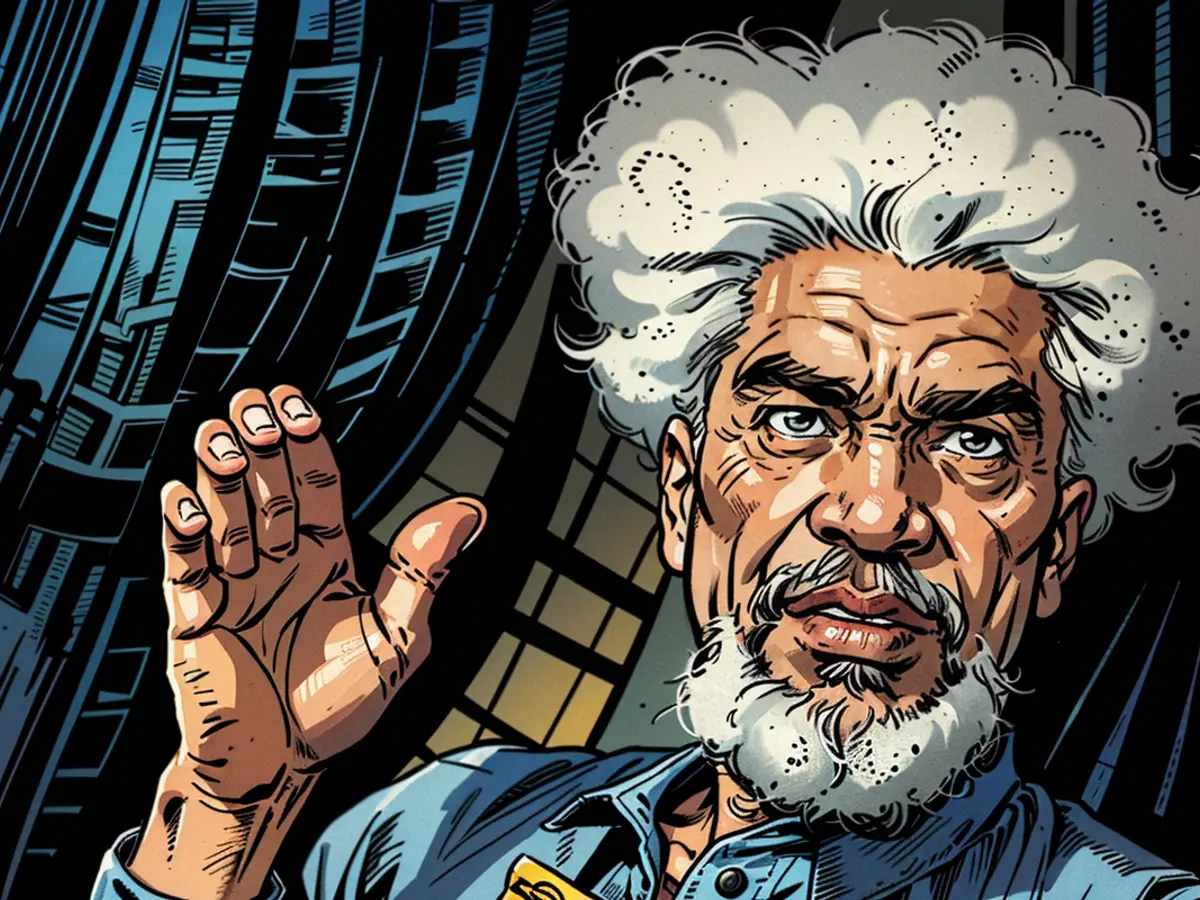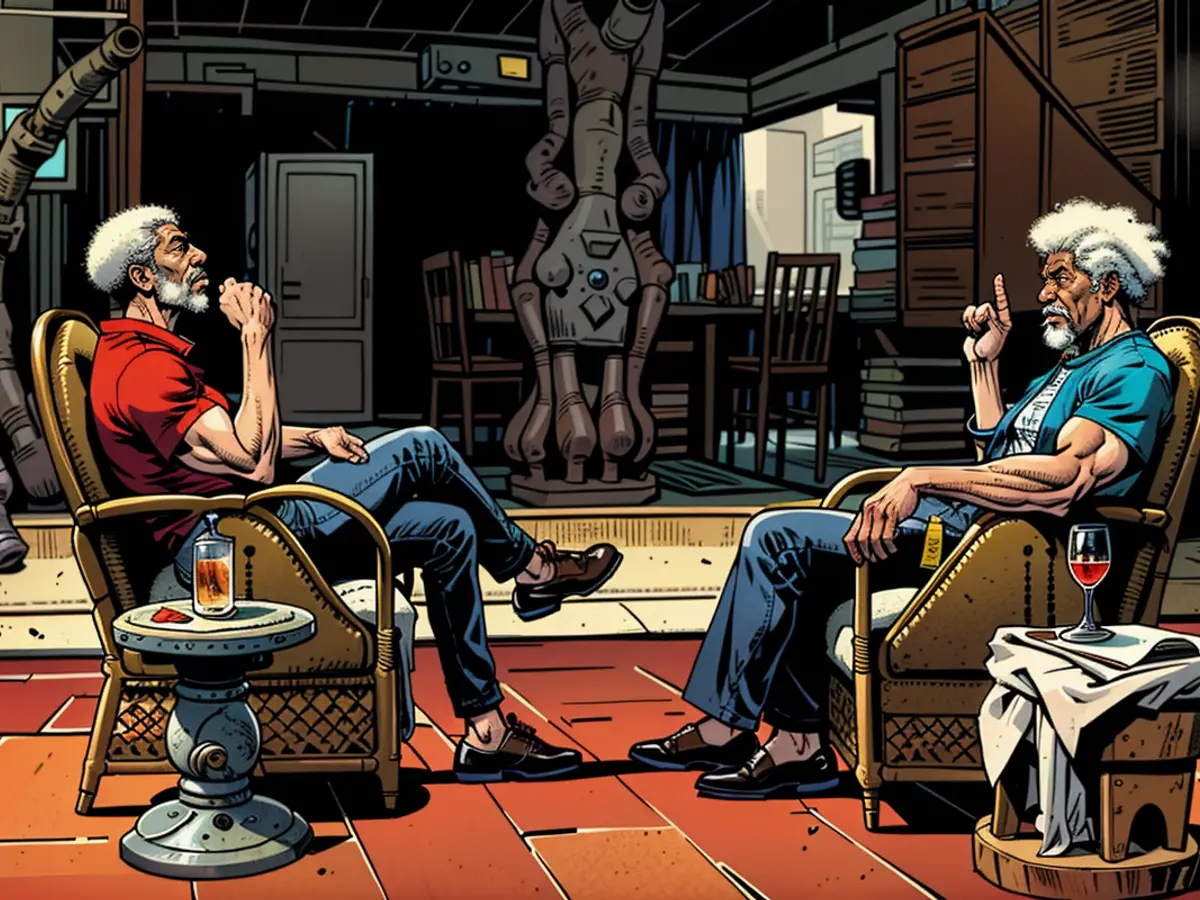"Finding my existence transformed into movie material, brings me anguish": Wole Soyinka discusses his memoir being turned into a film
During his solitary confinement, he etched thoughts and verses on meat bones using homemade ink and toilet paper. These concepts eventually transformed into the memoir "The Man Died," published in 1972, which serves as the foundation for a film of the same name, depicting the prominent playwright and novelist's life during the peak of the civil war.
At present, aged 90, in his home in Abeokuta, Southwestern Nigeria, Wole Soyinka sat down with CNN's Larry Madowo to discuss the psychological toll that period of imprisonment had on him and the resilience he developed as a result - reflecting on his extraordinary life and dreams yet to be fulfilled.
The following interview has been edited and condensed for clarity.
Larry Madowo: How did it feel to be incarcerated merely for advocating for what you believed in?
Wole Soyinka: It was a difficult period for me. Spending a total of 22 months isolated, deprived of books and paper, constantly having my cell inspected, with absolutely nothing to stimulate my mind.
I found that the most resourceful category of individuals I have ever encountered is the prisoner. A prisoner must survive; it's a test of survival, not self-improvement.
During solitary confinement, the most space-efficient enterprise a person could undertake is mental exploration. I crafted my own ink using dirt, and fashioned a pen from the bones in my food, thereby creating a self-sustaining mental microcosm. It was a perilous period for the mind as well.
I would often hallucinate, so I'd spring up and attempt to destroy those unsettling imaginative images. Eventually, I overcame that phase, and later, I began to recall forgotten formulas in geometry and trigonometry that I'd long despised, using them to make calculations on the ground. Miraculously, I rediscovered the principle of permutations and combinations. Those concepts I had detested in school became my sustenance.
LM: Have you had the opportunity to watch the film adaptation of your prison memoir, “The Man Died”?
WS: Not yet. I should clarify that turning any aspect of my life into a public viewing experience feels overwhelming to me. I collaborated with the production team to help locate a hiding place where I operated during the civil war. They sought a house resembling one we used during that period.
However, it's not just about me; it's also about that particular era. I might eventually watch it, but not immediately. Even this interview, I won't watch it right away. It takes me some time to acclimate to watching myself.
LM: It's surprising that you avoid celebrating your birthdays, but you recently turned 90.
WS: Surprisingly, I don't feel 90. I do follow a modest ritualistic aspect of celebrating my birthday, but I prefer to observe it in private. Typically, on my birthday, I would retreat into the forest. That's my customary birthday celebration routine.
LM: Can you recall when your political activism first began?
WS: I was an avid eavesdropper on my parents' conversations, especially those of my father's colleagues in the Anglican church. I would sit behind an armchair, listening intently.
My mother would then relate these conversations to me. My father's circle of acquaintances who were also politically active, further fueled my political awakening.
When women rioted in this very town where we are now, Abeokuta, my mother participated as a lieutenant of women's rights activist, Mrs. Ransome Kuti. As a child, I served as a messenger between various women's camps, relaying their messages during the disorder.

LM: It seems that your mother's political activism played a significant role in shaping your life's work.
WS: Absolutely. Being directly involved in this militant struggle against an unjust situation faced by these women, witnessing their marketplace goods being confiscated by police if they failed to pay taxes, and their brutal treatment if they did not comply, I instinctively stood with the women, which became evident in my literature.
LM: There's a rumor about you secretly infiltrating a radio station to swap a political broadcast with a more critical message, is that true?
WS: Yes, it's true. I felt compelled to halt the further dissemination of inaccurate results. I was tried and acquitted, so there's no reason to conceal it anymore.
I directly witnessed the demolition of polling stations, even the shredding of vote results. At that point, I was deeply entrenched in politics, but when I noticed this repressive regime attempting to resurface, and people must remember, it was the most skeptical regime that publicly declared on the radio, "We don't care if you vote for us," it ignited my previously sharp militant spirit. Therefore, it was all part of an ongoing battle on numerous fronts. Yes, I was guilty, but there was no other choice at the time.
Question: After winning the Nobel Prize in Literature in 1986, it took a considerable amount of time before another (Black) African was awarded that honor. What was that experience like back then?
Answer: Feeling secluded. I experienced immense relief when the following African recipient was announced since a substantial burden was placed upon you. It was as if your audience suddenly expanded due to your African heritage. On one hand, a strong feeling of acknowledgment, which is undeniably positive. It opened certain doors, but there weren't many doors that I was eager to enter. I merely appreciated my profession for what it was.
On the other hand, particularly in societies like ours, it exposed you significantly more. I always remind people that one of the most brutal dictators we had, Sani Abacha, would have been content if he had executed a Nobel Laureate, if he managed to put that on his CV. Sadly, he had to settle for executing a writer and his eight associates. I'm referring to Ken Saro-Wiwa.
Consequently, I was exposed to extreme danger since I refused to abandon my beliefs and activities, merely because I had been designated as a Nobel laureate. Why should I halt activities that consumed me earlier, simply because I have been recognized as a Nobel laureate?
However, it was wonderful when one Nobel Laureate after another (from Africa) began to emerge. Now, I've had the opportunity to enjoy being a Nobel laureate rather than feeling like an exhibit Sometimes.
Question: You told students of an exchange program named after you that you still have aspirations to go to space. What excites you about space?
Answer: I developed an interest at a young age. The stars and constellations captivated me, and I often fantasized about a state of utter emptiness, which led me to imagine actually venturing into space. I remember when Armstrong set foot on the moon, I was in prison at the time, which proved beneficial during that childhood exercise. My prison bars dissolved in an instant just by imagining them on the moon. Then space exploration began.
Until one day, through the mail, one of the associations for human development that I belonged to provided me with some free tickets for a zero-gravity flight simulator; by the time I was 70 years old. I proceeded to San Jose (California) and experienced space for myself, an experience that remains one of the most thrilling moments in my life.
Question: Richard Branson is now taking individuals to space.
Answer: If Branson appeared now and said, "I've found a spot for you in space," I would honorably conclude this interview right away. At this point, I'm still in reasonably good shape, and I am confident that I can endure the gravitational stress; I am determined. I am open to the opportunity to go into space, regardless of any consequences there. Then I can finally satisfy that childhood fascination.
Wole Soyinka reflected on his stint as a political activist, tracing it back to his youthful days when he eavesdropped on his father's colleagues' conversations and his mother's involvement in women's rights activism.
During the interview, Larry Madowo asked about Soyinka's feelings upon winning the Nobel Prize in Literature, and Soyinka mentioned how it felt isolating as the first African Nobel laureate but gratifying when more Africans followed in his footsteps.








